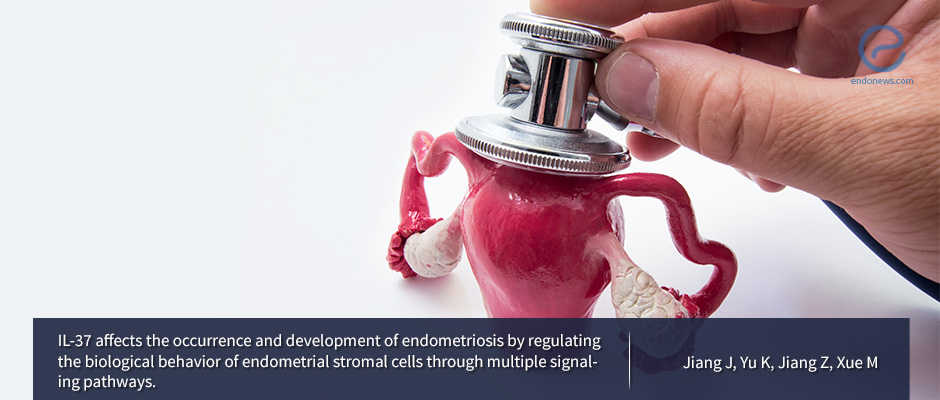IL-37 regulates ectopic endometrial stromal cells to prevent endometriosis
Oct 22, 2018
Dr. Xue group revealed for the first time that IL-37 affects the occurrence and development of endometriosis.
Key Points
Importance:
- Currently, little is known about the events that lead to the adhesion, growth, and progression of endometrial stromal cells to endometriosis.
Highlight:
- IL-37, as an anti-inflammatory cytokine, suppresses the proliferation, adhesion, migration, and invasion of human endometrial stromal cells derived from the ovarian endometriosis samples, to conclude that IL-37 may affect the occurrence and development of endometriosis through multiple signaling pathways.
What's Done Here:
- Ectopic endometrial stromal cell cultures are prepared from women with ovarian endometriosis during laparoscopic treatment for infertility.
- IL-37 siRNA and scramble siRNA (control) were transfected into endometrial stromal cells; proliferation, adhesion, migration, and invasion was compared.
- Mice were intraperitoneally injected recombinant IL-37 to understand the effect of upregulated IL-37 on mice with endometriosis.
Key points:
- Effects of IL-37 on inflammation-related cytokines:
- IL-37 overexpression significantly suppressed inflammatory cytokines, on the other hand, IL-37 knockdown significantly upregulated them, both at protein and mRNA levels.
- Effects of IL-37 on endometrial stromal cell proliferation, adhesion, migration, and invasion
- IL-37 overexpression significantly suppressed ectopic endometrial stromal cell proliferation, adhesion, migration, and invasion.
- In contrast, knockdown of IL-37 significantly promoted ectopic endometrial stromal cell proliferation, adhesion, migration, and invasion compared with the controls.
- Recombinant IL-37 treatment decreased endometriosis-like lesion size and lesion weight.
- IL-37 regulated the biological behavior of ectopic endometrial stromal cells through multiple signaling pathways such as β-catenin, p-p38, p-ERK1/2, and p-JNK, and this signaling was abolished by a Wnt/β-catenin inhibitor.
Lay Summary
Endometriosis has been identified as a chronic inflammatory disease. It has been shown that in the plasma and peritoneal fluid, women with endometriosis exhibit aberrant numbers of immune cells and concentrations of cytokines and chemokines that promote a chronic inflammatory environment compared with healthy women. More specifically, expression of some cytokines, including interleukin (IL)-1, IL-2, IL-4, IL-5, IL-6, IL-8, IL-10, and IL-13, in the follicular and peritoneal fluid of women with endometriosis differ from that of women without.
Interleukin-37 is a recently discovered member of the IL-1 family and functions as a suppressor of inflammatory and immune responses. Based on the emerging importance of IL-37 in several inflammatory conditions, the Dr. Xue group from China evaluated the in-vitro effects of IL-37 on proliferation, adhesion, migration, and invasiveness of ectopic endometrial stromal cells, and explored involved pathways.
To find the effects of IL-37 on inflammation-related cytokines, the level of IL-37 expression was manipulated through inhibiting (knocking down by siRNA) or inducing by recombinant molecules.
IL-37 overexpression significantly suppressed IL-1β, IL-6, IL-10, and TNF-α, whereas, knockdown of IL-37 significantly upregulated their protein and mRNA expression compared to the control. Proliferation, adhesion, migration, and invasion of ectopic endometrial stromal cells were significantly suppressed by IL-37 overexpression and increased by the IL-37 knockdown.
From the in vivo experiment, the lesion size of endometriosis mice treated with recombinant IL-37 was significantly decreased compared with the control mice. From the data which analyzes inflammation-related cytokines and multiple pathways such as β-catenin, p-p38, p-ERK1/2, and p-JNK, the author found that IL-37 regulated the biological behavior and MMP-2/9 expression of ectopic endometrial stromal cells.
In conclusion, Dr. Xue group suggest in their recent publication appeared in Biological Chemistry that IL-37 suppresses the proliferation, adhesion, migration, and invasion of human ectopic endometriotic stromal cells from the ectopic ovarian endometrioma samples of women, through multiple signaling pathways, thereby affecting the occurrence and development of endometriosis.
Research Source: https://www.ncbi.nlm.nih.gov/pubmed/29924731
endometrial stromal cells endometriosis IL-37 anti-inflammation

